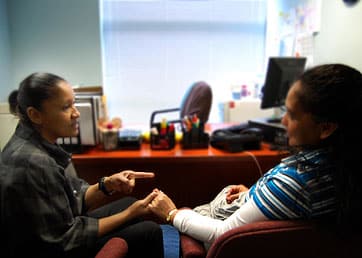
 BOSTON (WOMENSENEWS)–For six years she could not take a shower alone.
BOSTON (WOMENSENEWS)–For six years she could not take a shower alone.
He watched her shower.
When she came home, he searched her intimate parts for signs of infidelity.
Her husband sexually assaulted her, harassing her economically and emotionally, day in and day out, she said, wiping away tears.
"He did everything to me," said Olga, who was born in Honduras and asked that her full name not be used to protect her privacy. She can speak little English and is undocumented in the United States.
Clenching her fist, she said she was scared of being deported and was petrified of her abuser. She found herself locked in a labyrinth of helplessness.
Olga was too ashamed to share her story with anyone.
A few months ago, she mustered the courage to approach Doris Alleyene, a domestic violence advocate at the South End Community Health Center in Boston.
Alleyene, who also works at Casa Myrna Vazquez, a nearby domestic violence agency, said she helped Olga obtain a restraining order against her husband, a U.S. citizen.
Now, she said, she is teasing out Olga’s trauma, assisting her to reconstruct her life "as a free person."
Greater Vulnerability, More Hurdles
Immigrant women–including those who are undocumented and refugees–are more vulnerable to domestic violence and face steep hurdles when they seek help, said Isa Woldeguiorguis, policy and systems advocacy director at Jane Doe Inc., a Boston-based group that works to reduce domestic violence.
In Massachusetts, approximately 1 in 4 immigrant women is a victim of some form of domestic violence, said Richard Chacon, executive director of the Massachusetts Office for Refugees and Immigrants.
In the general Massachusetts population, there was a three-fold increase in domestic violence-related homicides between 2005 and 2007, according to a report published by Jane Doe Inc. These statistics were enough to alarm the Massachusetts Office of Health and Human Services into releasing a public health advisory on domestic violence in June 2008.
Still, recent data from Jane Doe Inc. indicate that domestic violence cases continue unabated. Between October 2008 and September of this year, 15 women, five men and three children have been killed in cases involving domestic violence in Massachusetts.
Statistics from other parts of the nation continue to paint a bleak picture for immigrant women, advocates say.
In New York City, 51 percent of intimate partner homicide victims are foreign-born, according to a 2004 report by the New York City Department of Health and Mental Hygiene.
Sixty percent of immigrant Korean women nationally were battered by their husbands, according to the National Institute of Justice and the Atlanta-based Centers for Disease Control and Prevention.
An Incomplete Story
Alleyene said the statistics don’t tell the whole story. "We are reporting on those who step up and speak. What about those who don’t do it because of their culture, because they are afraid? There are many untold stories."
In October, domestic violence awareness month, various organizations that work with immigrant women have held events to highlight the increase in domestic violence.
For example, Saheli, a Boston-based group that works to end abuse among South Asian women, organized a "Walk Against Domestic Violence" on Oct. 4.
The walk’s goal was to send a message to immigrant women who are afraid to seek help, because of language and cultural barriers, "that there is help out there," said Rita Shah who is on the organization’s board of directors. This year, 130 new cases of domestic violence involving South Asian women from the Boston area have been reported to Saheli, she said.
There is relief available for immigrant women under the Violence Against Women Act, or VAWA, which was enacted in 1994, said Hisham A. Leil, an attorney at Western Massachusetts Legal Service in Springfield, Mass.
Battered immigrant women, including undocumented women, may petition for U-visas, which grant legal residency for themselves and their children without the knowledge of the abuser. Victims of physical or mental abuse and aggravated assault can also request a work permit under VAWA, Leil said.
Misinformation Poses Obstacle
However, because of misinformation among victims as well as shelters, many women are unaware of their rights and benefits, Leil said. Among undocumented women there is also the perennial fear of deportation, he added.
Immigrant women are scared of their abuser and often do not speak up because they fear for their safety, said Paulette, a domestic violence survivor who also asked that her full name not be used to protect her privacy. "He is fighting with you and if you take a phone and go call the police, he is going to kill you," she said, her voice becoming indignant.
At the same time, the victims are wary of the police because they are frightened the police will report them to immigration officials, she said.
The fear of deportation and social stigma are forever etched in their minds, said Paulette, who was born in Haiti. She now volunteers at the Association of Haitian Women in Boston, based in Dorchester, Mass.
Paulette said she goads other women to speak up against abuse, learn English, get a job and seek freedom.
For more information:
Part 1: DV Among Refugee and Immigrant Women
http://www.youtube.com/watch?v=VRkCKO1V1BU
Part 2: DV Among Refugee and Immigrant Women
http://www.youtube.com/watch?v=L7_U5b-XhC8
Note: Women’s eNews is not responsible for the content of external Internet sites and the contents of site the link points to may change.


